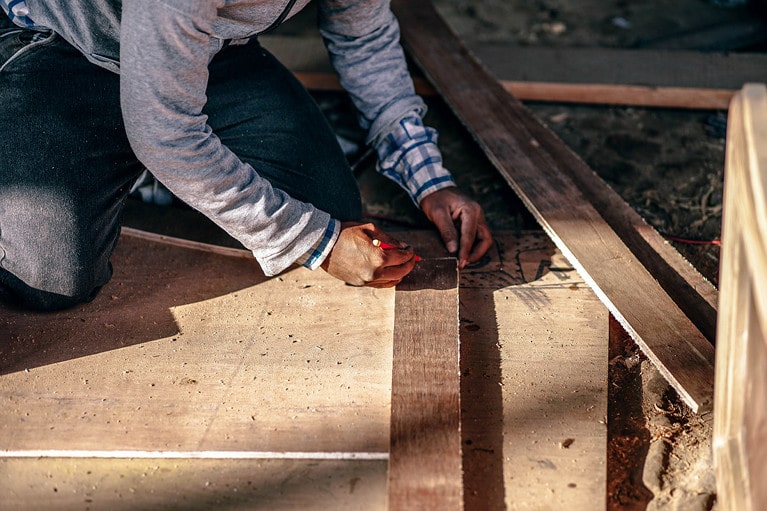
The DA is approved, the builder chosen and you think you are ready for your renovation.
It’s the perfect time to check your plan of action, and we’re happy to share Addbuild’s experience of hundreds of renovations to guide you.
Should I Stay or Should I Go?
It’s probably the first decision, and one that will impact your planning the most.
Leaving your home is going to add to costs… staying could add to your stress and disruption.
Over 80% of Addbuild clients stay in their homes throughout the process so we have worked around many families and are happy to do so. However, every renovation is different and for some, leaving is the only option.
If you are going to move out for a short time, can you stay with relatives? Ask friends if they or anyone they know are looking for house-sitters. You might need to adjust the timing of the renovation accordingly, so ask as far ahead as you can.
If cost-effective accommodation is available, being out of the house can sometimes also help the builders complete the job quicker.
Staying put
If you do choose to stay, inevitably you will have to put up with quite a bit of disruption.
Again, planning and preparation is key to minimising the impact:
- Remove anything that may be in the way of the works;
- Store valuables and fragile knick knacks in a safe place;
- Store pictures and other wall hangings as there will be vibration;
- Remove carpets and rugs unless they will be replaced after the works;
- Cover furniture, computers and electricals during the day as the work will generate a lot of dust. If you can, seal off areas with plastic sheeting to keep them as dust-free as possible.
- Tradesmen generally start early – 7am is the norm – so be prepared to adjust your morning routine.
- If your kitchen is out of action, set up a temporary one in another room with the basics: fridge, toaster and portable stove top. Camping shops are your friend!
Communicate, communicate, communicate
Help your builder help you by keeping the lines of communication open at all times.
Have a preconstruction meeting to check through the plans and specifications, particularly if there has been a delay between signing contracts and commencing the work such as when waiting for Council approval.
Notify them of any circumstances that may affect their schedule once construction commences – especially if you are staying in your home – as this may have much more far reaching effects than you may envisage.
Speak to your site supervisor regularly, and follow up anything important in writing as not all conversations can be remembered.
Raise any issues immediately no matter how small or potentially innocuous they may seem so they can be dealt with quickly and efficiently, potentially saving everyone time and money.
In our experience, it is better to arrange specific site meetings if any issue arises rather than organising pre-scheduled site meetings when there might be nothing to discuss.
All communication must go through the builder/site supervisor not the tradesmen on site as generally they only know about their portion of the works and any opinion on other matters may not reflect the true schedule.
Ensure all changes to the plans or specifications are done in writing (a Variation) even if there is no associated cost.
Have a contingency budget
You’ve probably seen the standard question on Grand Designs: “how much is your budget?” followed quickly by “what’s your contingency?”.
Planning is vital to keep the costs to schedule and as agreed, however, it may also pay to keep something back in case you decide you want to make a change as the building work progresses.
In the end, you have to live in your renovation and it’ll be cheaper to ask the builders to make a change whilst they are there than asking them to return after they have completed the original plan.
Take a break
Invest in some ‘you’ time: treat yourself and the family to a weekend away, especially if you have stayed in the house and saved the associated costs.
Stress builds up slowly, so it’s often hard to recognise how affected you might be. You’ll come back from your break refreshed and with more energy to survive the rest of the renovation.
Love thy neighbours
As well as communicating with your builders, talking with your neighbours is also important. Keep them informed and show that you care about the impact the work may be having on them.
Most will be more concerned to help you and, hopefully, good for a cup of tea, a friendly chat and a break from your mid-renovation home.
Read our ‘Consumer Guide to Home Improvement’ for more details on what you can do to make your renovation go as smoothly as possible.
At Addbuild, reducing stress for our customers is a big part of what has kept us in business for over 30 years, so we hope this advice has helped ease your mind.
We’re proud of our work and also proud of our blog which was just featured in the Top 100 Home Improvement Blogs on the Planet!
